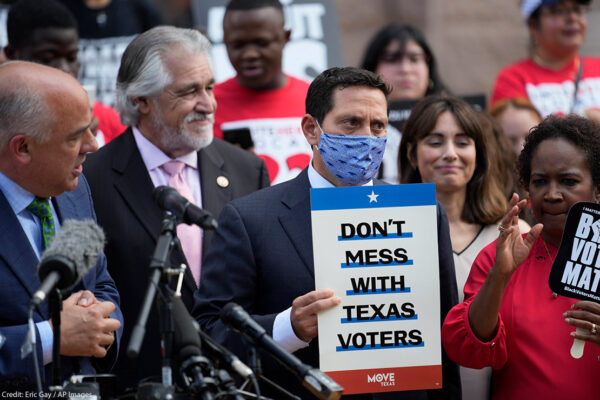Voting Rights
Featured
Washington, D.C.
Aug 2025

Voting Rights
League of Women Voters Education Fund v. Trump
On March 25, 2025, in a sweeping and unprecedented Executive Order, President Trump attempted to usurp the power to regulate federal elections from Congress and the States. Among other things, the Executive Order directs the Election Assistance Commission—an agency that Congress specifically established to be bipartisan and independent—to require voters to show a passport or other citizenship documentation in order to register to vote in federal elections. If implemented, the Executive Order would threaten the ability of millions of eligible Americans to register and vote and upend the administration of federal elections.
On behalf of leading voter registration organizations and advocacy organizations, the 51Ć·˛č and co-counsel filed a lawsuit to block the Executive Order as an unconstitutional power grab.
U.S. Supreme Court
Aug 2025

Voting Rights
Callais v. Landry
Whether the congressional map Louisiana adopted to cure a Voting Rights Act violation in Robinson v. Ardoin is itself unlawful as a gerrymander.
Georgia Supreme Court
Jun 2025

Voting Rights
Eternal Vigilance Action, Inc. v. Georgia
The 51Ć·˛č and partner organizations intervened in this case to represent the rights of voters and voting-rights organizations in a case challenging a number of rules passed by the Georgia State Election Board. We challenged the rule requiring that the number of votes cast be hand counted at the polling place prior to the tabulation of votes. In a critical victory for Georgia voters, in June 2025, the Georgia Supreme Court upheld a lower court’s decision permanently blocking the rule requiring hand counting of ballots at polling places before tabulation — a process widely criticized for risking delays, ballot spoliation, and voter disenfranchisement.
U.S. Supreme Court
May 2025

Voting Rights
Racial Justice
Allen v. Milligan
Whether Alabama’s congressional districts violate Section 2 of the Voting Rights Act because they discriminate against Black voters. We succeeded in winning a new map for 2024 elections which, for the first time, has two congressional district that provide Black voters a fair opportunity to elect candidates of their choosing despite multiple attempts by Alabama to stop us at the Supreme Court. Despite this win, Alabama is still defending its discriminatory map, and a trial was held in February 2025 to determine the map for the rest of the decade.
In May 2025, a federal court ruled that Alabama's 2023 congressional map both violates Section 2 of the Voting Rights Act and was enacted by the Alabama Legislature with racially discriminatory intent.
South Carolina Supreme Court
Jan 2025

Voting Rights
League of Women Voters of South Carolina v. Alexander
This case involves a state constitutional challenge to South Carolina’s 2022 congressional redistricting plan, which legislators admit was drawn to entrench a 6-1 Republican majority in the state’s federal delegation. Plaintiff the League of Women Voters of South Carolina has asked the state’s Supreme Court to conclude that the congressional map is an unlawful partisan gerrymander that violates the state constitution.
Texas
Oct 2024

Voting Rights
OCA-Greater Houston v. Paxton
Texas has growing Hispanic and Black populations that helped propel record voter turnout in the November 2020 election. The Texas Legislature responded to this increased civic participation with an omnibus election bill titled Senate Bill 1—SB 1 for short—that targeted election practices that made voting more accessible to traditionally marginalized voters like voters of color, voters with disabilities, and voters with limited English proficiency. Since 2021, SB 1 has resulted in tens of thousands of lawful votes being rejected, and it remains a threat to democracy in Texas.
All Cases
156 Voting Rights Cases

U.S. Supreme Court
Apr 2016
Voting Rights
Evenwel v. Abbott
Whether the Constitution prohibits states from doing what it mandates for Congress – creating legislative districts on the basis of total population.
Explore case
U.S. Supreme Court
Apr 2016

Voting Rights
Evenwel v. Abbott
Whether the Constitution prohibits states from doing what it mandates for Congress – creating legislative districts on the basis of total population.

Ohio
Apr 2015
Voting Rights
NAACP v. Husted
Ohio voters will gain greater access to the ballot in a settlement announced April 17, 2015 by the 51Ć·˛č. The agreement with Ohio Secretary of State Jon Husted stems from a federal lawsuit, NAACP v. Husted, which challenged Ohio's attempt to slash early voting opportunities.
Explore case
Ohio
Apr 2015

Voting Rights
NAACP v. Husted
Ohio voters will gain greater access to the ballot in a settlement announced April 17, 2015 by the 51Ć·˛č. The agreement with Ohio Secretary of State Jon Husted stems from a federal lawsuit, NAACP v. Husted, which challenged Ohio's attempt to slash early voting opportunities.

U.S. Supreme Court
Jan 2015
Voting Rights
Arizona State Legislature v. Arizona Independent Redistricting Commission, et al.
Whether an independent redistricting commission created by Arizona voters through the initiative process is constitutional.
Explore case
U.S. Supreme Court
Jan 2015

Voting Rights
Arizona State Legislature v. Arizona Independent Redistricting Commission, et al.
Whether an independent redistricting commission created by Arizona voters through the initiative process is constitutional.

U.S. Supreme Court
Jan 2014
Voting Rights
Shelby County v. Holder
The Voting Rights Act of 1965 is one of our nation’s most critical federal civil rights statutes. Section 5 of the Voting Rights Act, which is a key element of the Act, requires certain jurisdictions that have a history of discriminatory voting practices to get advance approval from the federal government before changing their election laws.
Explore case
U.S. Supreme Court
Jan 2014

Voting Rights
Shelby County v. Holder
The Voting Rights Act of 1965 is one of our nation’s most critical federal civil rights statutes. Section 5 of the Voting Rights Act, which is a key element of the Act, requires certain jurisdictions that have a history of discriminatory voting practices to get advance approval from the federal government before changing their election laws.

U.S. Supreme Court
Jun 2013
Voting Rights
Arizona v. Inter Tribal Council of Arizona
Whether Arizona may require proof of citizenship before registering to vote in federal elections when federal law does not.
Explore case
U.S. Supreme Court
Jun 2013

Voting Rights
Arizona v. Inter Tribal Council of Arizona
Whether Arizona may require proof of citizenship before registering to vote in federal elections when federal law does not.
